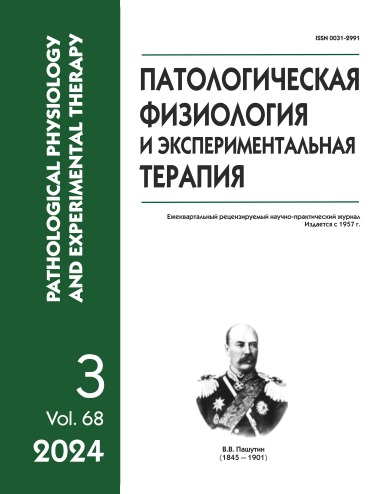Гепатопротекторное действие цикория обыкновенного (Cichorium intуbus L.) при интоксикации крыс сулемой
DOI:
https://doi.org/10.25557/0031-2991.2024.03.75-84Ключевые слова:
: Cichorium intуbus L., сухой экстракт, модель острой интоксикации крыс, хлорид ртути (II).Аннотация
Химическое загрязнение среды обитания создает серьезную угрозу здоровью населения, приводит к росту заболеваемости, в том числе к увеличению заболеваний гепатобилиарной системы. Заболевания печени, тяжесть их течения требуют комплексного решения указанной проблемы и создания новых эффективных лекарственных средств. Особое внимание уделяется лекарственным препаратам растительного происхождения, обладающим комплексным профилактическим и терапевтическим потенциалом. Цель исследования заключалась в оценке гепатопротекторного действия цикория обыкновенного травы экстракта сухого (ЦОТЭС) на модели острой сулемовой интоксикации крыс. Методика. Исследование выполнено на самцах крыс Wistar. Модель острого токсического поражения печени вызывали однократным подкожным введением сулемы в дозе 3 мг/кг. ЦОТЭС вводили в желудок крысам за 1 час до инъекции сулемы и в последующие 20 дней в дозах 100 и 500 мг/кг. Гепатопротектор Силимар® вводили по той же схеме в терапевтической дозе 100 мг/кг. На 21 день опыта регистрировали интегральные показатели здоровья экспериментальных животных, брали пробы периферической крови для определения биохимических показателей. В конце эксперимента проводили патогистологические исследования печени крыс. Cтатистическую обработку полученных результатов проводили с помощью лицензионной программы Statistica version 13 (TIBCO Software Inc, США). Результаты. Исследование на крысах с экспериментальной моделью острой интоксикации печени сулемой показало, что исследуемый экстракт проявлял гепатопротекторное действие в дозах 100 и 500 мг/кг, снижая их гибель и токсическое действие на печень, нормализуя биохимические и морфологические показатели. По степени выраженности гепатозащитного действия на указанной модели патологии печени ЦОТЭС в указанных дозах соответствовал силимару, широко применяющемуся в настоящее время в медицинской практике гепатопротектору. Заключение. Исследование впервые раскрыло новые аспекты фармакологической активности ЦОТЭС, которые проявлялись в его антитоксическом действии. Результаты исследования послужили основанием для создания на основе изученного экстракта нового лекарственного препарата для лечения заболеваний печени различной этиологии, в том числе, вызванных интоксикацией солями тяжелых металлов.Загрузки
Опубликован
2024-10-09
Выпуск
Раздел
Оригинальные исследования
Как цитировать
[1]
2024. Гепатопротекторное действие цикория обыкновенного (Cichorium intуbus L.) при интоксикации крыс сулемой. Патологическая физиология и экспериментальная терапия. 68, 3 (Oct. 2024), 75–84. DOI:https://doi.org/10.25557/0031-2991.2024.03.75-84.













